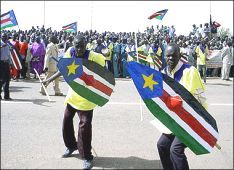SPLM/A takes part in drafting of transitional constitution
KHARTOUM, Sudan, Feb 22, 2005 (PANA) — A delegation from the separatist Sudan
Peoples Liberation Movement/Army (SPLM/A) is due here next week
to take part in the drafting of a constitution for the six-year
transition that was agreed with Khartoum last month to end two
decades of fighting in the south.

|
|
Southern Sudanese celebrate in the streets of Khartoum yesterday’s landmark peace deal, ending more than two decades of civil war in southern Sudan, Jan 10, 2005. (AFP) . |
An adviser at the State House in Khartoum, Bodria Suleiman told
journalists here late Monday that a national drafting committee,
which includes SPLM/A representatives would begin work on the
interim constitution next week.
The authorities in Khartoum are, however, encountering
difficulties getting other political forces, notably the
opposition National Democratic Alliance (NDA) to contribute to
the drafting process.
“We are not going to get involved in a scheme exclusively agreed
upon by Khartoum and the SPLM/A,” said NDA deputy leader
Abdurahman Mohammed Saeed, adding nonetheless that the exiled
opposition alliance remains committed to an agreement it recently
signed with Khartoum in Cairo, Egypt.
Earlier Monday, local media reports affirmed that Max Plank
Institute in Berlin, Germany had proposed guidelines for the
constitutional draft, which it elaborated in consultation with
the authorities in Khartoum and the (SPLM/A).
Khartoum and the separatists sealed a comprehensive peace
agreement last 9 January in Nairobi, Kenya ending more than two
decades of war between the largely Islamic north and mainly
Christian and animist south.
Under the agreement, a transitional administration would be in
place for a period of six years, at the end of which a referendum
would be held on the question of independence for southern Sudan.
Both parties agreed that the country’s constitution would be
revised to reflect Sudan’s socio-cultural and religious
diversities during the transition.
